The hospitality industry in Europe provides for 1 in every 13 jobs. As such, it’s one of the largest sectors on the continent in terms of employment. It’s also one of the biggest employers of young people; 19.6% of the hospitality workforce is younger than 25, compared to 8.2% of the total workforce.
But you know what else is big?
The turnover in the hospitality sector.
Over 70% in the US and several other countries, much higher than the turnover in other industries. Now, part of this is due to the seasonal nature of the business and the fact that the industry employs so many young people. After all, recent graduates and high school students don’t usually work on a full-time basis.
But these industry-specific factors alone don’t explain the sky-high turnover rate the hospitality industry is struggling with. In fact, trying to get this number down starts with hiring the right people.
Although this may sound obvious, the reality often turns out to be a tad more challenging. Luckily, we’ve learned a thing or two about hiring top talent and can pass this knowledge on to you.
So let’s take a look at how you can learn what skills your high-performing hospitality staff has and how to identify these skills in your potential candidates.
What’s in?
- White paper
Before you continue!
Don’t forget to grab your free copy of our white paper on the digital transformation of restaurant volume hiring. Learn about:
- The challenges currently shaping the restaurant recruitment space
- How restaurant employers can navigate the tight labor market, and the role of technology in a future-proof recruitment process
- The four building blocks of a fully digital recruitment process

State of the hospitality industry
The hospitality industry is growing rapidly – including various sub-sectors like lodging/accommodation, food & beverages, travel, and recreation. Part of this growth is due to the booming economy (in the US, for example).
Another explanation lies in the fact that Millennials and Generation Z have now well and truly started to travel – something they do quite a bit more than their predecessors.
Contribution of travel and tourism to the global economy (in trillion US dollars)
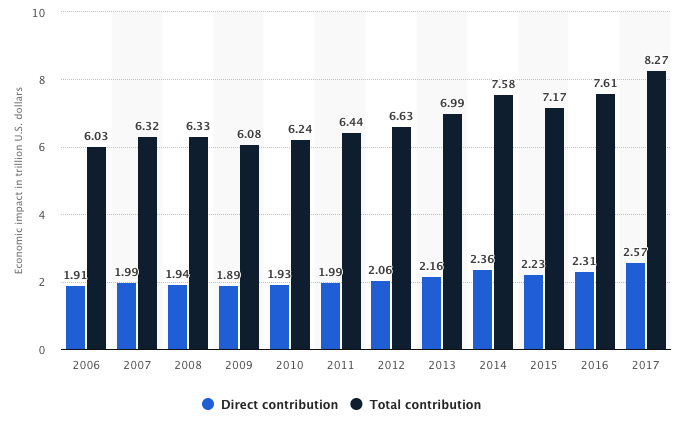
Contribution of travel and tourism to the global economy continues to grow. (Image source)
Back to the hospitality sector and its countless different jobs. Whether you’re in the lodging, food & beverages, or recreation business, all of these segments comprise different types of jobs – each of them varying in their specific requirements and expertise.
From bellboys and kitchen porters to kids club staff, hotel managers, and everything in-between. It’s therefore not hard to see that someone who works as a kitchen porter needs to possess different skills than the kids club team or the hotel manager.
However, all hospitality jobs have certain competencies in common. These are the personality traits and skills that you’ll need regardless of your job description. And they are exactly the skills we’ll focus on today.
So, let’s recapitulate for a second. On the one hand, we’ve got an industry that has to deal with an incredibly high turnover and on the other hand we’ve got that same industry that is booming. In other words: there is a constant need for high performing hospitality employees.
Who are your high performing employees?
But who are these people your business really can’t afford to lose? Put simply, high-performing employees are those people who are incredibly good at their job and enjoy it at the same time. To identify them, you’ll most likely need to implement an employee review process.
People with (most of) the following qualities that are also productive can be considered as top performers:
- Self-starters
- With strong interpersonal skills
- Who produce quality work
- Who are confident decision-makers
- Who continuously develop new skills
- Who listen to feedback and are open to suggestions
- Who make their own work and
- Who handle pressure
Bear in mind that these qualities are pan-industry wide, they’re not specific to the hospitality sector. We’ll take a look at personality traits and skills of top hospitality staff next.
Like what you see?
Don’t miss out. Subscribe to our quarterly digest to get the latest TA and TM resources delivered right to your inbox.
What personality traits do high-performing hospitality employees have?
Working in hospitality isn’t for everybody. There are the long, irregular hours, the often demanding customers and the intense physical side of the job. It takes a certain type of personality not only to deal with these challenges but to actually thrive on them.
A sample of personality traits to look for in hospitality staff:
- They are good listeners
- They are excellent communicators
- They truly want to make the customer happy
- They have a high tolerance to stress
- They’ve got an incredibly strong work ethic
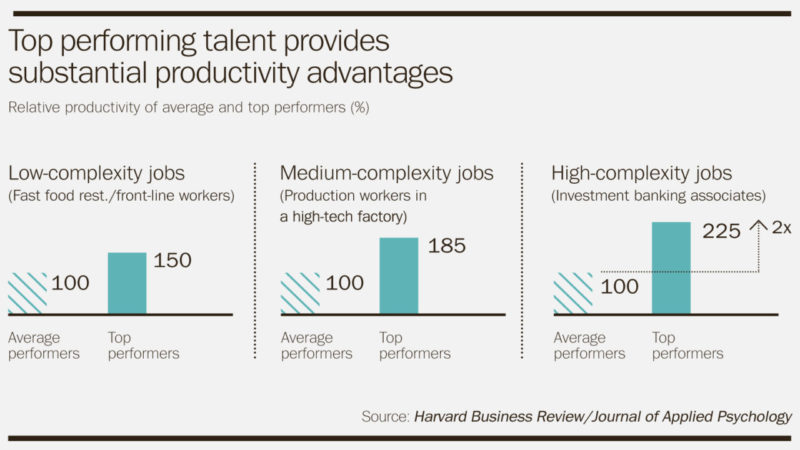
Hiring high performing hospitality employees increases productivity and thus provides a distinct advantage for your business. (Image source)
What skills does hospitality staff require and how do you measure them?
Besides these personality traits, there are also certain skills high-performing employees in hospitality possess. We’ll take a look at 5 of them.
1. Multi-tasking skills
If there’s one thing that’s important no matter what hospitality role you’re hiring for, it’s a candidate’s ability to multitask.
Imagine the waiter in a restaurant, for example. While serving food to the people at one table, they need to keep an eye on their other tables to see if anyone wants to order something.
The same thing goes for hotel receptionists. A situation in which they find themselves facing a group of not so very patient foreign guests wanting to check in while the phone keeps ringing is just one of the many examples.
Multitasking isn’t so much about being able to do several things at once as it is about the ability to quickly – and efficiently – switch between one task (or situation) and the other.
How do you measure one’s multi-tasking skills?
One of the ways to test a candidate’s multitasking skills is via a pre-employment assessment. A multitasking assessment can, for example, include two skill tests that assess short-term memory while challenging candidates on their ability to rapidly switch tasks.
Multitasking skills can be tested both in a visual and alphanumerical manner. Here’s an example of a question taken from a Harver multi-tasking assessment.
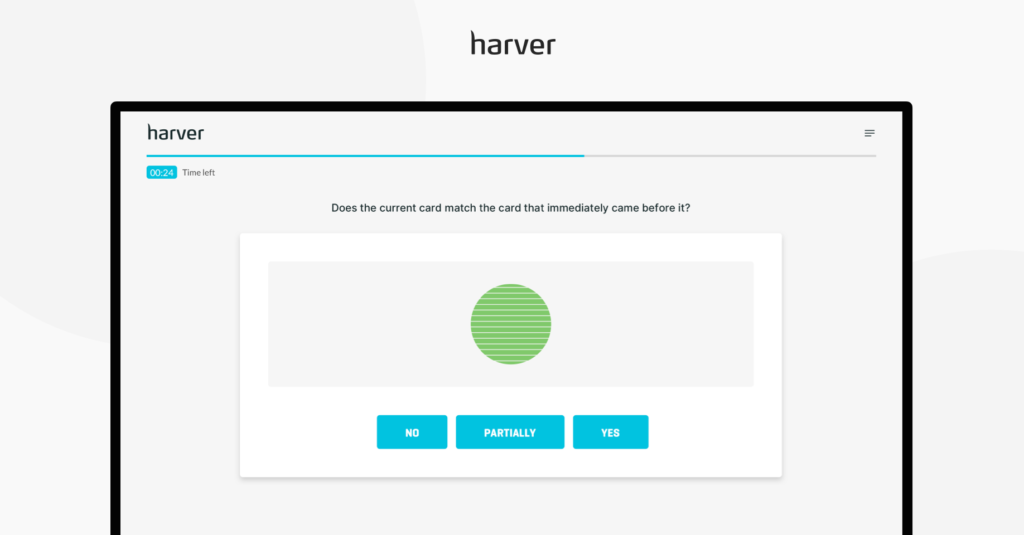
2. Spoken language skills
It’s probably safe to say that speaking at least a basic level of English is mandatory in today’s hospitality industry. People have never traveled as much as they do now, with Millennials and Gen Z leading the way.
Apart from the English language, it’s also possible that you hire non-native speakers to work in your, for example, hotel in Berlin, Germany. In that case, it’s essential that your staff speaks a good level of German. The same thing goes for any other country – and language.
High performing hospitality employees have good language skills. If they’re non-native speakers, they master the language of the country they’re working in and they are able to speak a decent level of English.
How do you measure one’s spoken language skills?
An applicant’s language skills can be assessed through grammar, vocabulary, and reading comprehension. The pre-employment assessment tool at Harver assesses reading proficiency directly while writing proficiency is assessed indirectly focusing on spelling, grammatical and idiomatic competencies.
Based on the results of the language test, you can see if the candidate’s knowledge is sufficient for a given role. The Harver spoken language assessment presents candidates with speaking tasks similar to what they would experience in a customer support role. The module is designed to blend an engaging candidate experience with a validated test result, to find candidates with the right level of English proficiency for your clients’ needs.
By combining word selection tasks with snippets of text to measure both language skill and fluency, the pre-employment test allows you to accurately and efficiently assess a candidate using internationally recognized English language standards. As with all Harver assessments, the content is fully customizable, allowing you to test with relevant storylines and adjust the difficulty.
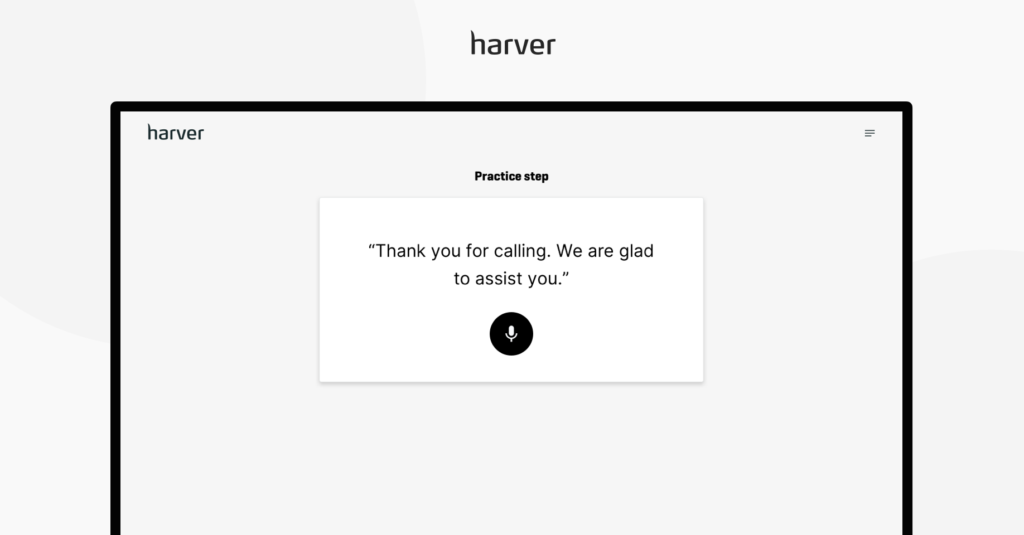
3. Service orientation skills
Granted, this one is a bit of a mix between someone’s personality on the one hand and a trained skill on the other. The hospitality industry is all about giving customers an unforgettable experience.
People are on holiday to get away from their busy lives and unwind. Or they’re going for a nice meal to celebrate a special occasion. They want to enjoy the moment and not worry about anything.
When it comes to creating the perfect customer experience, an eye for detail is key. Great hospitality staff is therefore always looking for ways to help their guests.
Did someone drop a knife on the floor? They’ve got a new one before they’ve even turned their head around to look for the waiter. Those newly-weds that asked if there was a room available with a sea view? They got a free upgrade since there were a couple of empty rooms anyway.
How can you tell if a candidate is service oriented?
A good way to find out how service-oriented someone is can be the use of a so-called situational judgment test (SJT). Situational judgment tests present your applicants with realistic, hypothetical scenarios that may occur on the job. In others words, candidates get a virtual taste of what their future job will be.
Here’s an example of Harver SJT for the restaurant industry. The questions included in these tests illustrate both routine tasks and critical incidents, assessing the candidate-job fit. At the same time, situational judgment tests offer candidates a realistic job preview, enabling them to self-select out of the application flow if they don’t like what they see.
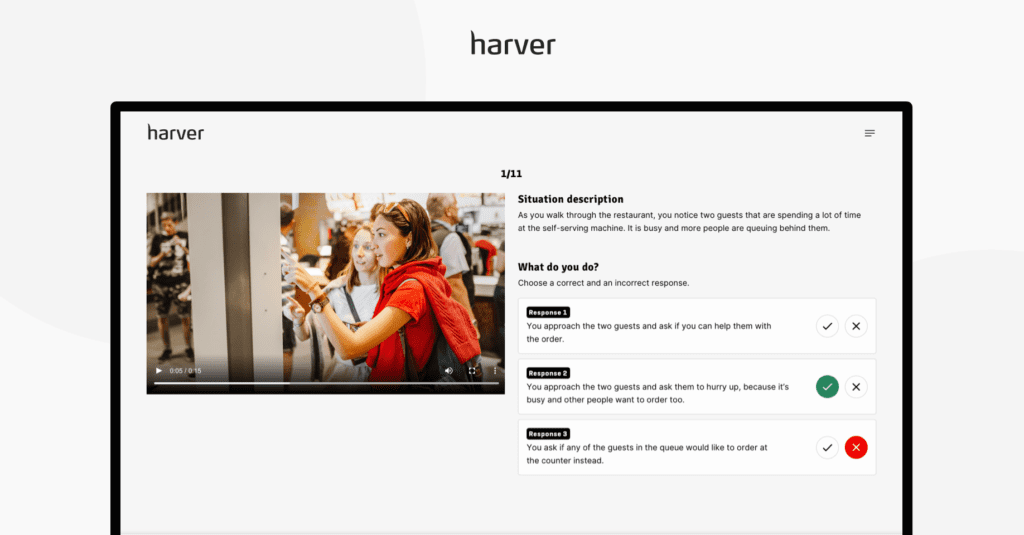
Harver’s feature video-based situational judgement tests allow you to see how your applicants would behave in a variety of real-life workplace situations. The SJTs are designed by industrial organizational (IO) psychologists and verified among actual employees. The top performer analysis identifies what responses are predictive for success in the role. This ensures that you can quickly pinpoint which applicants are most suitable for the role and company culture.
If you’d like to learn more about SJTs and see what they look like in practice, you can book a demo below.
Ready to transform your hiring process?
4. Coordination skills
In hospitality, teamwork is what makes the organization run. Everyone has their own role to fulfill but always in collaboration with their colleagues. There needs to be a synergy, people need to be able to adapt according to the actions of others.
A good sense of coordination is thus in order. High-performing employees in hospitality see the overall picture and everybody’s individual part in it. They notice when something risks slipping out of balance and they are able to correct things where necessary.
How do you measure one’s coordination skills?
When it comes to testing a candidate’s coordination abilities, a situational judgment test is again the way to go. It enables you to show your applicants relevant, on-the-job scenarios and their answers will give you valuable insights as to their sense of coordination.
As candidates go through the SJTs – or other assessments – avaialble in the Harver platform, their answers are scored, and the final scores are available in the backend of the platform. Recruiters can therefore easily see which candidates are more likely to be top performers, and which applicants have transferable skills.
Here’s for example how the candidate profile looks in the Harver system. Obviously, the specific job titles will vary depending on the industry and company open roles.
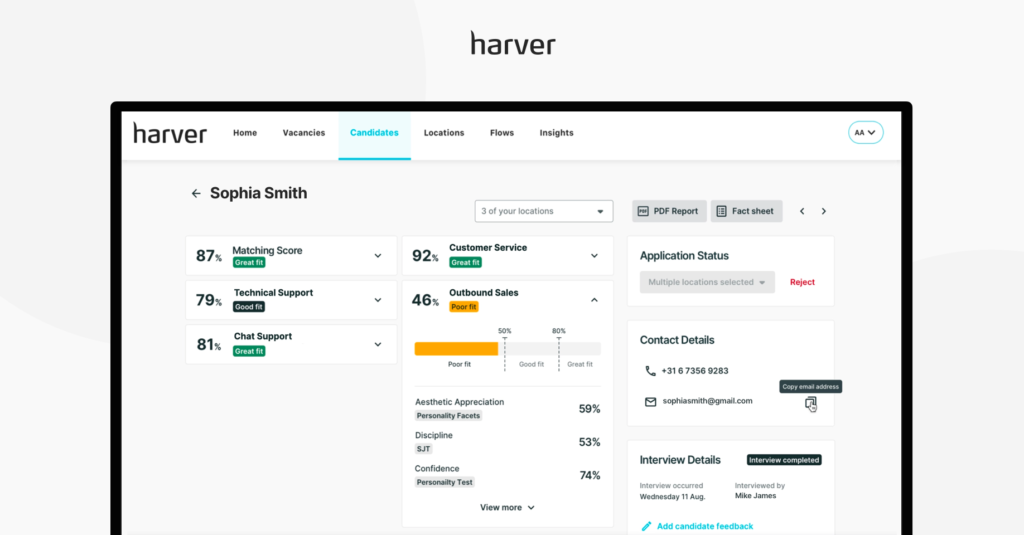
5. Stress management
There is stress tolerance – something that’s linked to someone’s personality – and then there is stress management – something that can be trained. High-performing employees in hospitality know how to keep cool in a high-pressure environment.
A necessary skill, since a lot of businesses in the hospitality sector are more often characterized as stressful (or super stressful) than not.
How do you assess stress management?
There are several ways to assess stress management skills. You can ask your candidates questions about how they deal with stressful situations and assess their answers. Furthermore, you can ask them to take a test designed to assess coping and stress management skills.
Or you can test their stress management skills with the help of a situational judgment test or a personality questionnaire.
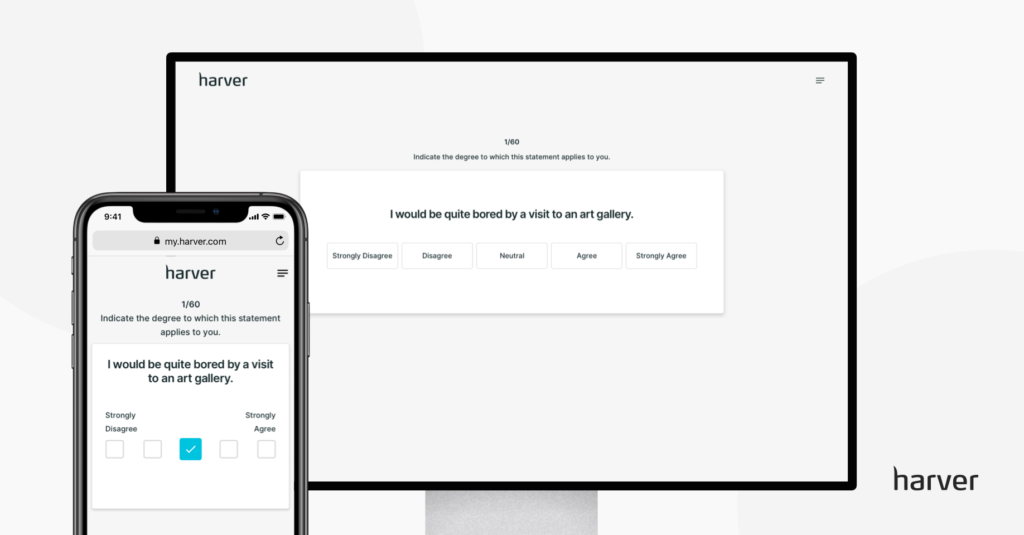
Once you’ve defined the skills of your high-performing employees, it’s time to use this knowledge in your recruitment efforts! You can use your high performers as a benchmark to hire similar people. This will help you reduce turnover, increase employee happiness, and, at the end of the day, grow your business and save money.

Annual cost of turnover is also not a negligible factor in recruitment. By improving your turnover rate, you will also cut your costs. (Image source)
Next step
The hospitality industry is growing rapidly. From restaurants and hotels to recreational business and lodging, every segment is booming – and constantly looking for high-performing employees as a result. While the industry’s seasonal nature and the above-average amount of young workers contribute to the high turnover in hospitality, a big part of the problem lies in the hiring process.
And that’s exactly where there is a lot of room for improvement. The best way to find great new staff is to analyze your current high performing employees and to look for the same skills in your candidates. The skills listed above are a good start.
However, even when your applicants have the right skills, they’ll still need further training and/or education. But the first step towards a considerably lower turnover rate is to hire the best possible people.
If you’d like to see how Harver can help you hire better and faster, you can book a demo below.
Ready to transform your hiring process?


